#c: deuteronomy
Text
Deuteronomy is busy supporting and encouraging the train cats, when... oh no! Jemima did a mischief!
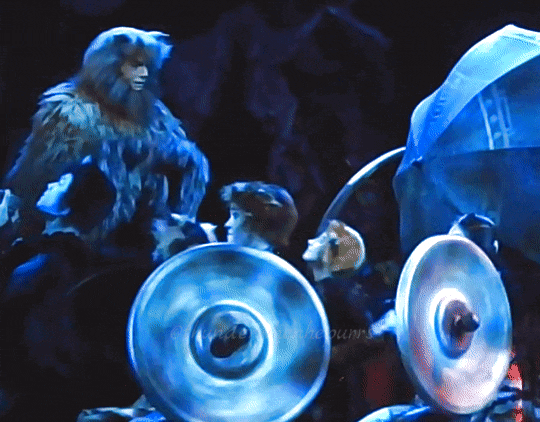
The Mistoffelees ears are just too tempting not to bap.
Mistoffelees has a deadly glare which Jemima knows better than to take seriously. All she has to do is giggle at him for it to melt into a smirk.
Vienna revival, 7 May 2022; filmed by @thunderwhenhepurrs. Lucius Wolter covering Deuteronomy, Suzie Murphy covering Jemima, Stephen Martin Allan as Mistoffelees, Anna Carina Buchegger as Rumpelteazer, Vicky Riddoch as Electra, and Meghan Peploe-Williams covering Tantomile.
#220507#cats the musical#vienna revival#2021 vienna#s: skimbleshanks#mistojem#susannah murphy#stephen martin allan#lucius wolter#meghan peploe williams#c: jemima#jemimaxmistoffelees#c: tantomile#c: mistoffelees#c: deuteronomy#deuteronomyxjemima#electraxtantomile
78 notes
·
View notes
Text
I like that the vast majority of the ballroom Cats cast is black because it seems like black actors only ever get cast as the same handful of characters in this show.
#I feel like I only ever see black actors cast as Old Deuteronomy Cassandra Grizabella Alonzo or Mistoffelees#and maybe Tugger bomba and C+T#(and obviously there are exceptions)#and yeah while that seems like a lot and they’re all great roles#that’s still a really narrow section of the cast of characters#blue’s thoughts#cats the musical
3 notes
·
View notes
Note
Why is 1 corinthians 16:14 your favorite verse?
Hello there ! . ˚ ♡
How are you today, my friend? What a nice ask this is — this made me smile c:
You’re referring to the verse in my bio I believe?
(“Do everything in love” — 1 Corinthians 16:14)
Hm I’m not sure if it’s my favorite! It is something I try to remember though :’)
Because I ask myself often: Did I love? Is this love? Am I doing this out of love?
That probably sounds easy . . but what about when you’re hurt? Or mistreated? Or wronged? Even then I must still remember to love ♡
(“You have heard that it was said, ‘Love your neighbor and hate your enemy’. But I tell you, love your enemies and pray for those who persecute you” — Matthew 5:43-44)
Genuine love heals & gives us hope — we must *always* love!
Of course as an imperfect human I will stumble at times, but God will help see me through anything & I trust Him :D
What about you? Do you have a favorite verse or one that you like to remember ?? I’d love to hear! ♡
Sending warm hugs & all my happiest thoughts! I pray that you take care & have a beautiful day ~ !! XO
🧸 ♡ . ˚ * . 🌸 ʚ🤍ɞ
#<3#ask#deuteronomy 4:29 is another verse i like c:#lamentations 3:25 is good to keep in mind too !!#i really could list a lot for many different reasons !!#but i’m trying not to get carried away :’)#how are you though my friend ??#are you well? has your day been a good one ??#i pray it has been !!#sending love & hugs ! <3#take care & all the best to you !! <333#:D#xo ! <3#🤍 . ˚ * . 🌸
6 notes
·
View notes
Text
into the woods/cats AU because it turns out i'm VERY impatient and honestly can't wait for when i see the show next week so i'm making the list of characters now lmao:
The Baker: Tugger
The Baker's Wife: Bombalurina
Cinderella: Demeter
Red Riding Hood: Jemima
Jack: Pouncival
Jack's Mother: Jellylorum
The Witch: Grizabella
C's Prince/The Wolf: Macavity
Mysterious Man: Old Deuteronomy
Red's Grandmother: Jennyanydots
Rapunzel: Victoria
C's Father: Bustopher
C's Stepmother: Griddlebone
Lucinda: Electra
Florinda: Etcetera
R's Prince: Plato
the biggest change to this AU will be that Victoria's ending will be the same as movie!Rapunzel's ending, because her musical!ending is just way too sad
also all of the familial/romantic relationships in this AU will be the same as in "Into the Woods" canon (but they obviously don't carry over into my regular canon)
@storyweaverofgondor here's the au bestie <3
#keeping c's prince and the wolf as the same character#idk how that'll work out#but yeah lmao#also iykyk with tugger and vicki's relationship 👀#that's the other reason she's not having musical!rapunzel's ending 👀#also tugger and bomba's baby will be hestia she will be included in this au lmao#because i can't resist#into the woods#cats the musical#into the woods au#rum tum tugger#bombalurina#demeter#macavity#jennyanydots#old deuteronomy#victoria#plato
4 notes
·
View notes
Text



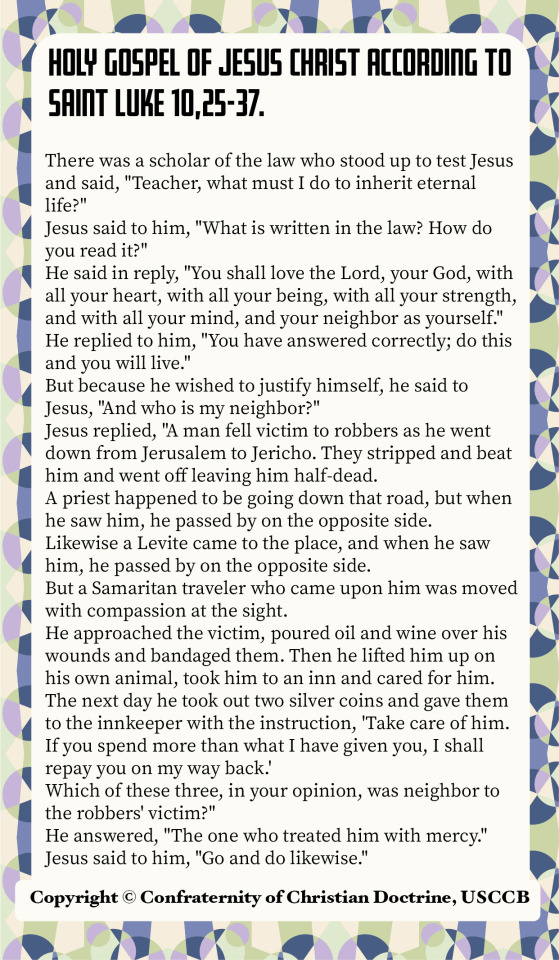
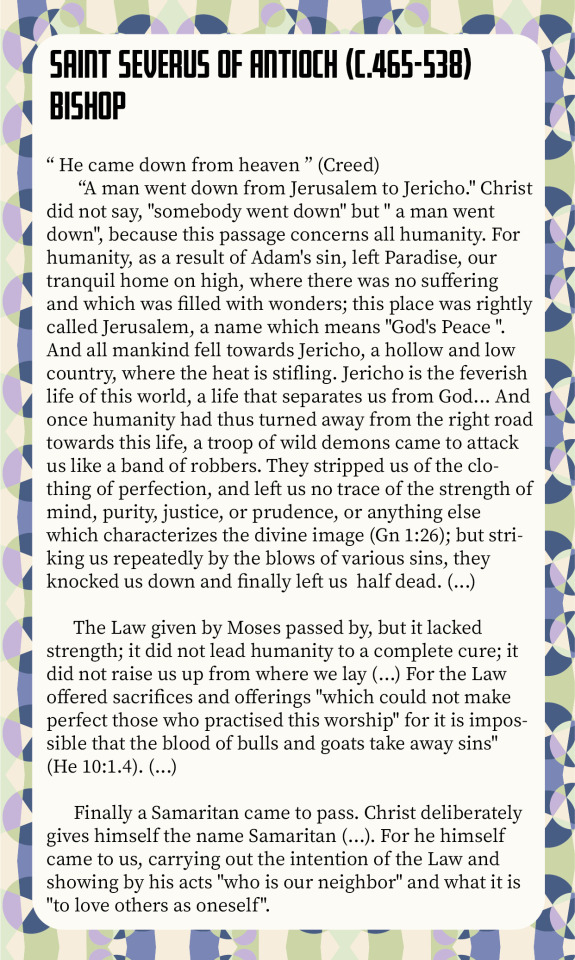
Readings for 10 July
10/07/2022
#Book of Deuteronomy 30#Book of Deuteronomy#Psalms 69(68)#Psalms#Letter to the Colossians 1#Letter to the Colossians#Holy Gospel of Jesus Christ according to Saint Luke 10#Holy Gospel of Jesus Christ according to Saint Luke#Saint Severus of Antioch (c.465-538)#God#Lord#Jesus#Holy Spirit#love#hope#heaven#life#peace
1 note
·
View note
Note
Since I lack reading comprehension maybe you can explain what this passage in Leviticus means:
"As for the male and female slaves whom you may have, it is from the nations around you that you may acquire male and female slaves.You may also acquire them from among the aliens residing with you, and from their families that are with you, who have been born in your land; and they may be your property. You may keep them as a possession for your children after you, for them to inherit as property. These you may treat as slaves, but as for your fellow Israelites, no one shall rule over the other with harshness."
We went over this in the 19th c. but I'd love to hear your thoughts!
Sure. So with historical texts, including the Bible, you have to read them through the context in which they were written and not through a modern 21st century lens.
When you see the word "slave" here you're obviously assuming it's referring to chattel slavery but that's actually not the case.
To understand where God stands on slavery, you have to look at more than one verse in the Bible. It's a whole entire book and you can't just pull out one verse and think that makes you a theologian. In books like Leviticus, Exodus, and Deuteronomy, God was giving an entire law code to his people and all the laws were connected to each other. They weren't given as stand alone orders, which is why context is so important here.
In Exodus, the book prior to Leviticus where you got that verse, God lays out in the Mosaic law "Now one who kidnaps someone, whether he sells him or he is found in his possession, shall certainly be put to death." - Ex 21:16
This verse clearly shows that God views "kidnapping" people and selling them or if they are even found in their "possession" to be punishable by death, which is kind of weird for Him to say since you're pretty sure he condones slavery.
There's also a verse in Deuteronomy 23 that says "You shall not hand over to his master a slave who has escaped from his master to you. He shall live with you in your midst, in the place that he chooses in one of your towns where it pleases him; you shall not mistreat him."
So if God has outlawed kidnapping people, selling people, and has deemed that if a person working for you wants to leave they are free to do so and you should not force them back or mistreat them, it certainly seems that he's outlawed all the main components of slavery.
And now we get to that verse in Leviticus.
You have to remember the Bible was not written in English and the Hebrew word used here for slave, in this context, really would mean something more like a servant or employee.
And it makes sense, as you have the word "acquire" in the verse to understand it more like hire especially since we know in Exodus God outlawed selling people so it wouldn't make any sense for him to condone it in Leviticus.
The only time the Bible is "condoning slavery" is when it's a case of voluntary servitude. Slavery, back in the time the Bible was written, was not the chattel slavery you are familiar with today. It was often used as a way to pay debts. People would agree to work for someone else for a specified period of time in order to pay off a debt and then once they had fulfilled their agreement they were free to go. It was not cases of people being enslaved and forced to work for someone else with no compensation against their will.
If you read more than that one verse whenever God is "condoning slavery" this is the kind of slavery he's talking about and he puts most of the power of the slave/master relationship with the slave as he is allowed to leave whenever he wants and if it would by chance be a lifelong arrangement that would only occur if it was by the slave's choosing.
So the verse you pulled is not an endorsement of enslaving people it's essentially God saying you can "hire" people from all those groups.
The word property sounds harsh because in English it is a harsh word but remember the Bible wasn't written in English and in Hebrew it's essentially the equivalent of a boss referring to someone as "their" employee.
85 notes
·
View notes
Note
Are you willing to condemn the racism the Mormon church has taught you?
The church has been wrong on Racism, Patriarchy, Misogyny and Anti-queerness.
One message that is given in scriptures in different ways is that God loves us all and treats us the same, and we should do likewise.
Deuteronomy 10:17 - For the Lord your God is God of gods and Lord of lords, the great God, mighty and awesome, who shows no partiality and accepts no bribes.
Mark 12:31 - The second is this: ‘Love your neighbor as yourself.’ There is no commandment greater than these.”
John 13:34 - “A new command I give you: Love one another. As I have loved you, so you must love one another.
Acts 10:34 - Then Peter began to speak: “I now realize how true it is that God does not show favoritism
Romans 2:11 - For God does not show favoritism.
Romans 10:12 - For there is no difference between Jew and Gentile—the same Lord is Lord of all and richly blesses all who call on him,
Galatians 3:28 - There is neither Jew nor Gentile, neither slave nor free, nor is there male and female, for you are all one in Christ Jesus.
Colossians 3:11 - Here there is no Gentile or Jew, circumcised or uncircumcised, barbarian, Scythian, slave or free, but Christ is all, and is in all.
2 Nephi 26:33 - ...black and white, bond and free, male and female; … all are alike unto God
Furthermore, the Book of Mormon can be seen as a cautionary tale about a group of violently racist misogynists who wound up getting annihilated explicitly because they would not stop being violently racist misogynists. It also teaches that pride and wealth inequality doom civilizations. Too many Mormons view the Nephites as the heroes of the Book of Mormon and want to be like them, but D&C 38:39 warns us, "lest ye become as the Nephites of old."
45 notes
·
View notes
Text
When Crowley met Jesus, and the other demon at Golgotha
You know the scene. 33AD. Aziraphale is watching the crucifixion take place and certain fem-presenting demon sidles up to him.
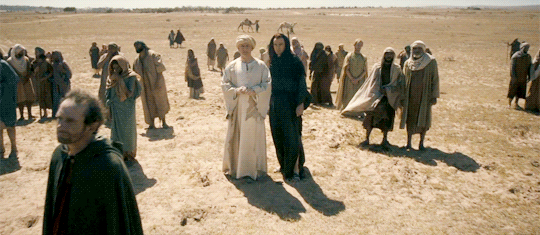
Aziraphale greets them, and finds out they have changed their name.
"What is it now?" he asks them. " Mephistopheles? Asmodeus?"
I know most you have learnt by now that Asmodeus is the demon of lust, and this is obviously Aziraphale's idea of a flirty little joke (perhaps the first we see? because he's the one who's really as "mad as bag of frogs" after all and that's why Crowley's made an appearance, because he was probably just in the area, you know...), but I haven't seen or come across much meta about the first suggested name, which is a GO "lead balloon" moment.
Mephistopheles, Aziraphale? That's the name you thought of here? Of all places? jfc...you bad, bad angel! lmoa! This is a serious, sombre situation you are witnessing!
Mephistopheles is the name of the fictional demon sent to do a deal with the character Faust in a story that dates back to Germany in the early 1500s. Faust was a like a scientist in his day, well educated in things like alchemy and astrology and other mystical arts, maybe even having wizard powers (why not?) But he was hungry for more power so he did a deal with the devil for 24 years of assistance to achieve and gain anything he desired, and at the end of that time he would be claimed by Hell. Needless to say, despite starting off well it didn't have a happy ending. (I wont go into details as there are lots of variants, and its not that short, and they aren't all that relevant to the point of the post.)
It has been a hugely influential story ever since, appearing in many forms over the years; in opera, theater, movies, novels, adaptations such as Oscar Wilde's The Portrait of Dorian Grey, and Queen's famous song Bohemian Rhapsody. Terry Pratchett also did a parody of it in his 1990 book Eric, and readers have often noted the similarity to the Hell depicted there to the Hell in GO.
Its the origin of the idiom "to do a deal with the devil" and a Faustian bargain. The mortals that enter into the deal with a powerful supernatural entity are usually set up to fail, and we go along with it because we are so used to the trope, its one we've come to expect the bargainer to fail in some spectacular fashion. It's one that keeps being repeated again and again because it so interesting to explore - often the protagonist is looking for some form of happiness, sometimes revenge, and hopes the deal will deliver, but find out the hard way that they should be careful what they wish for because the delivery is a two-edged sword. They may find out that they don't actually want what they thought they wanted, or they get what they want in an very unexpected way.
Back to Golgotha, and our demon and angel. We learn the demon has merely modified their name to Crowley. And yes, they met Jesus.
C: "Seemed a very bright young man. I showed him all the kingdoms of the world."
A: "Why?"
C: "He's a carpenter from Galilee, his travel opportunities are limited."
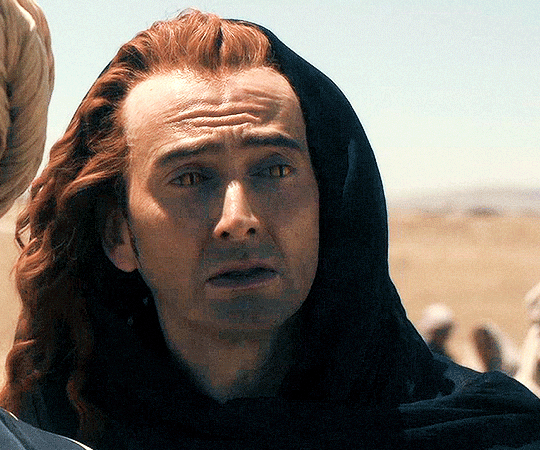
This is a reference to one of the the tests of faith Jesus was put through before his crucifixion, from the Book of Matthew.
I like this modern version I found:
For the third test, the Devil took him to the peak of a huge mountain. He gestured expansively, pointing out all the earth’s kingdoms, how glorious they all were. Then he said, “They’re yours—lock, stock, and barrel. Just go down on your knees and worship me, and they’re yours.” Jesus’ refusal was curt: “Beat it, Satan!” He backed his rebuke with a third quotation from Deuteronomy: “Worship the Lord your God, and only him. Serve him with absolute single-heartedness.” The Test was over. The Devil left. And in his place, angels! Angels came and took care of Jesus’ needs. Matthew 4:8-11 The Message
Or, you could say: Crowley showed Jesus all the kingdoms of the world, and offered the bargain that he could rule them all if he would renounce God and worship Satan instead, but Jesus just turned to the demonic messenger and simply told him to "fuck off!"
And there we have it, folks. Mephistopheles, and Asmodeus. Touche, Aziraphale, you sly little shit stirrer.
#good omens#good omens meta#aziraphale#crowley#hard times#golgotha#asmodeus#mephistopheles#faust#all the kingdoms of the world#going along with Hell as far as you can#faustian bargains#doing a deal with the devil#you bad bad angel aziraphale#this is no time to be flirting and cracking jokes with your demon
84 notes
·
View notes
Note
That is correct, I didn't think the Mosaic law would be a practical way of running a society but that's what my client wanted so that's what I wrore
I don't really get the joke here, so I'm just going to take an opportunity to add another fact I found pretty interesting:
It was common in the Ancient Near East to create codes of law for display purposes (and outside it--cf. the Twelve Tables). This wasn't so much so that the common person could know and understand the law, because literacy rates were pretty low, but served a similar function as monumental architecture, to display the power of the ruler and at least notionally their justice. But in practice, the law as it actually functioned could be pretty different from the law as these monuments proclaimed it.
I think it's interesting to consider the law-as-a-symbol. There was some incidental discourse crossing my dash recently about whether "law" as a general concept protects the weak from the strong, or whether it legitimates the rule of the elites. And I think the answer is that is obviously does neither: that a society has a system of law tells you nothing about how that system functions, and you have to dig into the nitty-gritty details to determine whether the society has "rule of law" (which is good) or "rule by law" (which is bad). The former is, hopefully, a system where the law binds everybody, attempts to be fair, and there is at least some effort to enforce it equally; the latter is where law is a justification for a system power that makes no pretense at that sort of thing.
And I think rule by law is a very common state of affairs, especially pre-French Revolution! I might be generous and say pre-Enlightenment at best. Because before you have an ideological starting point of "ok, everybody should be equal before the law and the law should be impartially enforced," one-off privileges, aristocracies, and random exemptions from various rights and duties are pretty normal, and one of the major functions of law is to codify these inequities to make sure the king or his judiciary respects them. There is a reason one of the big components of revolutionary projects historically has been administrative reform, because in redrawing internal boundaries and revising old law codes, you can do away with these inequities and legally enshrined hierarchies.
And that pattern of inequity, of legally enshrined hierarchy, is of course thoroughly present in Leviticus and Deuteronomy. As Dan McClellan points out, agency in these codes flows downhill and it flattens everything in its path. The agency of men erases that of women: the law treats what happens if a man violates the property rights of another man over the women under his dominion (his daughters or wives), but the agency of the women ("consent" in modern parlance) simply makes no difference to the law. The only place women's sexual agency shows up in the law is in the one situation where a woman is interacting with a creature lesser than her, i.e., if she lies with an animal.
Even in the European Middle Ages I think there were real disjuncts between the worldview of the people using these law codes for devotional purposes and the worldview of their authors. In the modern era, of course, those disjuncts are yawning chasms, and as a result you get some really weak apologetic attempts to try to reconcile modern ethics with (again, impractical, unworkable, entirely theoretical) Iron Age legal theory. But there are lots of places in the Bible--both in the law codes and in the narrative portions--where I think the disjunct is so great that the aftercomers can't really make heads or tails of the worldviews of their predecessors. This is where the apologists (and before them, the commentaries of the Talmud) often have to invent major details out of whole cloth to try to turn the situation into one that makes sense to them. It would be better, and easier to construct a more consistent system of ethics, to just jettison the bits that clearly aren't applicable to the concerns of your community--but then of course once you admit that what parts of your scripture you do and don't accept are contingent on their relevance to your community, it is no longer the timeless and authoritative book from God, and it ceases to be a useful way of structuring power.
And as with codes of law, holy writ is (among other things) about structuring power! Otherwise all religion would approximately resemble Unitarian Universalism, an honest, gentle, thoughtful faith that is approximately irrelevant.
#'mimetic fitness' is so often just a measure#of how enthusiastic your followers are#about kicking the crap out of anybody who disagrees with them#coercion and hierarchy are therefore great for mimetic fitness#even if they are terrible for human flourishing and happiness
20 notes
·
View notes
Text
I promise I will shut up about the Broadway Revival sometime soon but thinking about it again, I do think that if it were just bad, I wouldn’t pay any attention to it at all.
Like… I don’t really clown much on the West End Revival. I mean, yes, the three big changes in that production I know off the top of my head are A) Rap!Tugger, which most everyone hated, B) Growltiger costumes, which most everyone didn’t care about, and C) Sexy!Griz, which most everyone either hated intimately or didn’t care about. But even so, nobody really dissects the West End Revival the way we do the Bway Revival. And part of that may have to do with less accessible boots, but I’ve seen (probably) most of the West End Revival footage that exists and yet it’s the Bway Revival that gets my goat.
And, yes, the Gillian Lynne snub element of the Bway choreo definitely plays a big part in that.
But also… the Bway Revival is sometimes really good? The West End Revival just... *is*. It’s a 98 clone with slightly different (and generally disliked) costumes. If it weren’t for the sort-of-racist and unbearably cringe Rap!Tugger, I don’t think this production would get much attention within the fandom at all (despite doing really well financially), because that’s all it really is: a perfectly serviceable 98 clone.
(And that’s not a bad thing. I like 98. I like the West End Revival. It’s a good production with skilled performers, chunks of it are on yt check it out.)
But the Bway Revival changes don't universally suck. There are elements (lots of elements!) of the Bway Revival I adore and I genuinely think are better than the original. Everything to do with Macavity, imo, is just brilliant. The old Macavity fight choreo had this kind of cool abstract tribal vibe to it, but the new choreo looks violent. It also looks more catlike; Munk and Mac crouch low to the ground like hunched-up cats, they circle each other, and the hits actually look like they connect at the right angles. The goofier parts (the mutual ass-slap, the playing tug-of-war with Demeter, the piggyback ride) are removed so it feels more serious: Munk actually looks nervous or frightened sometimes despite not backing down, and it looks like the background cats might be being controlled (which explains why few cats try and help Munk during the fight until the end). Not even to touch upon the lighting and music.
Revival!Macavity’s style of movement is super unique and recognizable too, Daniel Gaymon’s Macavity is amazing, I love how the way he moves sometimes makes him look possessed by something (also his Plato was adorable, He Has The Range Darling). His costume is cool on its own, (I don't love the old Macavity design, which simultaneously makes him look more like a tiger and also a little boy wearing pajamas rather than a housecat) but I love how the little mane-like collar and wig curls makes him look like Tugger & I love the parallels between the two that this production emphasizes. Tugger, the tribe’s most popular cat & pride and joy, versus Macavity, the outcast. Tugger, who everyone wants, versus Macavity, who can’t seem to acquire the one cat he wants.
Plus Macavity’s mind control? In the classic Mac freezes the cats; in the Bway Revival he forces them to dance. In the show where dancing together is a symbol of togetherness and community. In the show where characters frequently imitate each other to indicate closeness or admiration. In the show where you spend like 5 minutes watching Grizabella the Outcast Cat fail to dance along with the others, Macavity forces the others to dance with him. NO NOTES WHATSOEVER.
And the extra lore and worldbuilding they add to the magic element? I don’t love the Macavity Interlude, but “He hypnotizes with his eyes/His head moves like a snake” in combination with the fact that it seems like Macavity needs eye contact to control other cats? Plus how Tugger, Munk, and Deuteronomy all seem to be immune to his powers to a degree?
This element isn’t really in the boot on yt but in later performances there’s a bit at the end of the fight where Macavity, (on the top of the car) visibly tries to use his powers on the gathered cats, and when he fails he looks down at his hands and then scrambles to grab the jumper cables. The idea that he has some kind of ‘magic meter’ that he is capable of using up somehow? Potentially explaining why he went the subtle route and tries to impersonate Deut rather than go in guns blazing for Demeter?
THE WAY DEMETER REACHES FOR HIM WHEN HE FIRST GRABS HER? The way she looks like she’s flailing and trying to get away from him the second time, after the fight? Tantomile jumping between Demeter and Mac the second he lets go of her?
AND DON’T EVEN GET ME STARTED ON THE MISTO/MAC PARALLELS I’VE BEEN WORKING ON A GIFSET FOR THAT
It’s so good. Those changes make me go insane. Because they’re deliberate, and pointed, and they add things to the story, build upon the story, and add more depth to the story. They’re also just cool and fun to look at and play around with. That’s the thing that gets me about the Bway Revival, because they were capable of making insightful and meaningful changes that genuinely elevated the source material in really cool ways.

#cats fan on main#and this all especially holds true in a piece of media like cats that relies so heavily on visual storytelling#from which like half of its audience walks away going 'wait was that just 2 hours of nonsense?'#if you dont want your audience to think theyre watching a bunch of fun nonsense (which fun nonsense is fine but the bway revival clearly--#--wanted to be taken seriously) then those visual storytelling elements have to be tight asf#jelliclerants
16 notes
·
View notes
Text
“Please, listen to me - and don’t scoff.”
I take issue with the way RTT is described in the various wiki entries I’ve seen for him, because they like to point out that the older cats merely tolerate him or are impatient with his activities.
A) no
B) really? No
C) evidence pls
but what he says at the start of Misto’s song is kind of telling, and I think it says something about who he is.
RTT has a reputation - he’s a cat that does what he wants, when he wants, which is - every cat tbh but he wants to feel special! he jumped in on the very very end of Jennyanydots’ number which is still rude, but he a) didn’t interrupt the song itself or the story and b) no one seems surprised or upset, they just go oh! it’s RTT being RTT. and he isn’t particularly kind to Grizabella; he’s kind of sarcastic in his interaction with her, but it’s not like he’s the only one to be dismissive of her.
During the Awefull Battle of the Pekes and the Pollicles, he jumps in with the bagpipes at the end and Munkustrap is exasperated - but arguably less so than when Mungojerry and Rumpleteazer get their barks out of order or when the Great Rumpus Cat enters on the wrong side of the stage. This isn’t an RTT thing - this is an everyone around Munkustrap being a goof while he’s trying to hold it together thing lol.
RTT sings Old Deuteronomy with Munkustrap - they BOTH obvs have a tremendous amount of respect for Old Deut, but RTT is the one who specifically says the village is proud of him in his decline. And when Old Deut shows up, he gets fucking psyched - RTT is a cool kid but he also gets excited about stuff! He is also the last one to officially greet Old Deut; it’s framed in a way where they kind of stare each other down, which is especially notable because RTT is standing on the pipe to be tall (I also like standing on things to be tall). But Old Deut is obviously relaxed and smiling, and RTT’s got the biggest fucking grin when he bows. It gives me cheeky “you’re not the boss of me” vibes, but he is very much accepting of the fact that Old Deut’s in charge, and I don’t think he cares much either.
RTT is also consistently pictured near Old Deut, when he’s not on stage or skulking in the shadows; shaking hands with him, or resting a hand on his shoulder, or just kind of vibing near him. He’s the one who suggests a way to get Old Deut back, to boot, so - I just don’t really get the idea that he’s got a tremulous relationship with the others. He cares SO MUCH, SO SO MUCH. He’s just also REALLY COOL.
What this tells me is that RTT does have mutually respectful relationships with a lot of the older cats; he’s also especially close to Old Deut. The kittens love him because of who he appears to be, and he’s just as goofy as the other older cats but in his own distinct way. It also tells me that he does know when to be serious and he also knows how to make that clear to his peers.
I’m still ruminating on the ‘don’t scoff’ thing, but for the most part, am inclined to believe it’s about what he’s going to suggest. imo, the cats know Misto has magic; he uses it for Munkustrap and Skimbleshanks the Railway Cat, Cat of the Railway Train. It’s never been crazy, though - lifting the trunk or turning lights on is relatively small, compared to magicking an entire person back. So I think he’s saying ‘don’t scoff, I know Misto can do it’.
Which also stands in contrast to a trope I saw when poking at fanfiction - that Misto has magic and the other cats dislike or fear him for it. I never got that vibe! The cats don’t like Macavity much but it doesn’t seem to be because of his magic so much as it is because, you know, he likes to break laws lol. And I guess because of the kidnapping and stuff. They come together once a year to decide which cat is gonna reincarnate, Old Deut’s apparently telepathic, etc etc - I think the magic is just part and parcel of who they are as Jellicles and he’s got a little more than most. It was more of a “I know you can do a cartwheel, but can you really do a backflip?” kind of vibe. He is still cheeky and exuberant during the number - but it’s coming from a place of respect and belief in Misto’s abilities.
(or he’s just hoping really hard that it’ll work, but doesn’t want Misto to doubt himself - either way, his faith is justified or his faith is what it takes for Misto to believe in himself; it gets the job done.)
Which is funny because even Misto is like “uhh” at certain points while RTT is like NO YOU GOT THIS
Anyway this is, in part, why I think RTT is going to be the next Jellicle leader rather than Munkustrap
46 notes
·
View notes
Text
you know that thing big cats do, where they pretend not to notice their cubs sneaking up on them then they do a massive dramatic startle when they get pounced on?

(X)
yeah. that's the only thing I can think of when I see the way the cats on the tyre react to the WOO-WOOO!! of the kittens' train whistle in Skimble's number.

even though Tugger was already in Maximum Sprawl he still managed to fall over backwards.
(Munkustrap said. fix. pat.)

Dominik Hees as Tugger, Alexander Auler as Munkustrap, Rory Six as Deuteronomy, Gerben Grimmius as Skimbleshanks, and Matthew Levick as Mistoffelees. Vienna revival, two days before closing night! 24 June 2022, filmed by @falasta and @cryptidvoidwritings.
#tuggerstrap#rum tum tugger#munkustrap#skimbleshanks#gerben grimmius#dominik hees#alexander auler#rory six#matthew levick#munkustrapxtugger#s: skimbleshanks#cats the musical#2021 vienna#vienna revival#220624#c: munkustrap#c: rum tum tugger#c: deuteronomy
227 notes
·
View notes
Text
dsmp characters as cats (1998) ((the stage recording)) (((NOT the CGI butthole movie))) songs
c!Tommy & Tubbo: Mungojerrie and Rumpelteazer. need i explain. british duo who causes problems
c!Philza: Gus: The Theater Cat. KIDDING he's Old Deuteronomy.
c!Wilbur: Grizabella: The Glamor Cat. But he's singing it abt c!dream. do u get me.
c!Sapnap: Rum Tum Tugger. i think he's the horny cat.
c!George: The Old Gumbie Cat. cuz haha it's a song abt sleeping. also just very funny to me
c!Karl: Skimbleshanks: The Railway Cat. It's abt the vibes also for some reason I think Karl has some train motifs??? am i crazy ?
c!Foolish: Mr. Mistoffelees. Magic dancing cat who has more power than anyone else. kinda goofy. foosh would definitely say "Presto!"in a gay ass voice.
c!Dream: Memory (Reprise). DESPERATELY wants to go back to his old life. wants his friends back. is horribly lonely. is ostracized by the rest of the group. dies at the end.
#root talks#dreblr#c!dream#c!wilbur#c!tommy#c!tubbo#c!philza#c!sapnap#c!george#c!Karl#c!foolish#unfortunately techno doesn't really fit any of the songs :(#he could be Daylight (specifically the verse that plays in memory (reprise) but idk I feel like that's a stretch#daaayliiiiight i muuuust wait for the suuuunriiiise#sorry sillabub has such a gorgeous and sweet voice#the fact she was removed from the movie for a weird has self insert version of Victoria I am going to explode#listen to my autism rant boy
27 notes
·
View notes
Text
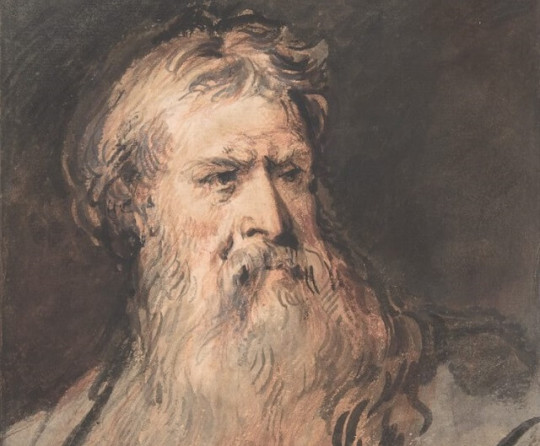
DON’T REMIND ME
These are the words that Moses addressed to all Israel on the other side of the Jordan.--Through the wilderness, in the Arabah near Suph, between Paran and Tophel, Laban, Hazeroth, and Di-zahab….
- Deut. 1:1
In this week’s Torah reading we begin the Book of Deuteronomy (Devarim), Moses’ final speech to the Israelites in the last five weeks of his life. The man who once described himself as “slow of speech and slow of tongue” (Ex. 4:10) now has a great deal to say. Moses rebukes the people for their lack of faith and repeated misbehavior in the wilderness, and recounts events that occurred and laws that were given during their forty-year journey.
Moses begins his epic lecture by mentioning certain places where the Israelites provoked God to anger. Rashi explains that Moses simply mentions the place names and not the sins committed there “out of honor for the Children of Israel.” But isn’t Moses criticizing the people? How does he honor them at the same time? Rav Yosef Nendik explains that when a person lacks self-awareness and is oblivious to what he has done wrong, he needs a long explanation about why he is being reprimanded. For one who already understands his mistake, a simple hint is enough.
Imagine a family on a cross-country road trip. At Mt. Rushmore the children can’t stop bickering and their fed-up parents pack them back into the minivan. The kids realize their mistake and cry to return to the monument, but it's too late. Another time, these siblings start to bicker and their mother wants to remind them why it's a bad idea. She says simply, “Mt. Rushmore.” She doesn’t need to bring up the insults they traded, or the family’s missed opportunity to enjoy the national monument. The children know full well what they did wrong that day. It is to the Jewish people’s credit that we needed only a small allusion to our sins to understand why we were being rebuked.
Image: “Study for the figure of Moses” by Jacob de Wit, c. 1730
Accidental Talmudist
7 notes
·
View notes
Text
⚠️ C/W: New Age Spirituality Is Demonic or Satanic, Exodus 20:4, Deuteronomy 5:8
Twin Flame: True vs. False

(Source)

(Source)

(Source)
2 notes
·
View notes
Text

“German musical performers Frank Logemann (C-L) as 'Old Deuteronomy' and Kerstin Ibald (C-R) as 'Grizabella' on stage during a preview of the musical 'Cats' as part of the 'Thunerseespiel' open-air musical event in Thun, Switzerland, 11 July 2017. The event runs from 12 July to 24 August.”
Photo by Thomas Hodel
#cats the musical#cats thunerseespiele#Cats Thunerseespiele 2017#cats non replica#grizabella#old deuteronomy#frank logemann#kerstin ibald
21 notes
·
View notes